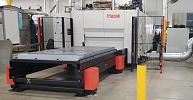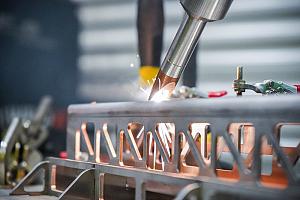Contributing Writer
- FMA
- The Fabricator
- FABTECH
- Canadian Metalworking
Categories
- Additive Manufacturing
- Aluminum Welding
- Arc Welding
- Assembly and Joining
- Automation and Robotics
- Bending and Forming
- Consumables
- Cutting and Weld Prep
- Electric Vehicles
- En Español
- Finishing
- Hydroforming
- Laser Cutting
- Laser Welding
- Machining
- Manufacturing Software
- Materials Handling
- Metals/Materials
- Oxyfuel Cutting
- Plasma Cutting
- Power Tools
- Punching and Other Holemaking
- Roll Forming
- Safety
- Sawing
- Shearing
- Shop Management
- Testing and Measuring
- Tube and Pipe Fabrication
- Tube and Pipe Production
- Waterjet Cutting
Industry Directory
Webcasts
Podcasts
FAB 40
Advertise
Subscribe
Account Login
Search
Trump loosens steel and aluminum import restrictions
Quotas set for Argentina, Brazil, and South Korea
- By Stephen Barlas
- September 10, 2018
President Trump made a slight concession on steel and aluminum tariffs via a presidential proclamation on Aug. 29, but it is unclear whether the White House will conduct a broader review of the exclusion process, which has been heavily criticized.
The proclamation only covered steel imports from Argentina, Brazil, and South Korea and aluminum imports from Argentina. Steel and aluminum import quotas were placed on those countries in lieu of the 25 percent steel and 10 percent aluminum tariffs. No exclusions were allowed for those “quota” countries.
Now, according to the Trump proclamation, at the end of August exclusions from quotas will be allowed if importing fabricators can make the case that insufficient quantity or quality is available from U.S. steel or aluminum producers. In such cases, an exclusion from the quota may be granted and no tariff would be owed.
A second provision in the proclamation affects steel articles destined for use in a facility construction project in the U.S. that were contracted for purchase before the decision to impose quotas and cannot presently enter the country because a quota has already been reached. In that instance, an exclusion from the quota may be granted, but the product may only be imported upon payment of the 25 percent tariff.
One aluminum industry official who did not want to be identified explained, “This new process won’t affect aluminum much right now, but it would if other countries opt to take a quota instead of the tariff. Absolute quotas are tricky to implement and can be disruptive for consumers, since it’s hard to know when exactly the quota will be reached and therefore hard to plan for purchasing and shipping. An exclusion process on the quotas could be a sort of ‘last resort’ option for the companies that might have purchased their steel before the quota was reached but haven’t yet had it delivered.”
NAFTA Reboot Would Help Manufacturers
The U.S.-Mexico revisions to the North American Free Trade Agreement (NAFTA) contain some major benefits for domestic manufacturers, particularly those in the auto industry. But metal fabricators may be unhappy that the agreement does not do away with U.S. tariffs on imported Mexican aluminum and steel.
Whether the U.S.-Mexico agreement even goes into effect probably hinges on whether Canada signs on to the U.S.-Mexico revisions, which may be necessary before Congress would approve the new NAFTA. It also is unlikely U.S. manufacturers would support a Mexico-only agreement.
“Because of the massive amount of movement of goods between the three countries and the integration of operations which make manufacturing in our country more competitive, it is imperative that a trilateral agreement be inked,” said National Association of Manufacturers (NAM) President and CEO Jay Timmons.
The agreement encourages U.S. manufacturing and regional economic growth by requiring that 75 percent of auto content be made in the U.S. and Mexico. Auto industry manufacturers that don’t meet these requirements will pay a 2.5 percent tariff on vehicles crossing the border. The original NAFTA sets the floor at 62.5 percent. Another provision requires that 40 to 45 percent of auto content be made by workers earning at least $16 per hour.
One thing the new agreement does not do is eliminate the 25 percent tariff on steel and the 10 percent tariff on aluminum imported into the U.S. from all countries, including Mexico and Canada. Mexico’s Secretary of Economy Ildefonso Guajardo Villareal said after the agreement was signed that he hoped the tariffs on Mexican exports to the U.S. of steel and aluminum would be eliminated in any agreement approved by Congress.
subscribe now

The Fabricator is North America's leading magazine for the metal forming and fabricating industry. The magazine delivers the news, technical articles, and case histories that enable fabricators to do their jobs more efficiently. The Fabricator has served the industry since 1970.
start your free subscriptionAbout the Author

Stephen Barlas
- Stay connected from anywhere

Easily access valuable industry resources now with full access to the digital edition of The Fabricator.

Easily access valuable industry resources now with full access to the digital edition of The Welder.

Easily access valuable industry resources now with full access to the digital edition of The Tube and Pipe Journal.
- Podcasting
- Podcast:
- The Fabricator Podcast
- Published:
- 04/30/2024
- Running Time:
- 53:00
Seth Feldman of Iowa-based Wertzbaugher Services joins The Fabricator Podcast to offer his take as a Gen Zer...
- Trending Articles
JM Steel triples capacity for solar energy projects at Pennsylvania facility

Fabricating favorite childhood memories

How laser and TIG welding coexist in the modern job shop

Robotic welding sets up small-batch manufacturer for future growth

Ultra Tool and Manufacturing adds 2D laser system

- Industry Events
Pipe and Tube Conference
- May 21 - 22, 2024
- Omaha, NE
World-Class Roll Forming Workshop
- June 5 - 6, 2024
- Louisville, KY
Advanced Laser Application Workshop
- June 25 - 27, 2024
- Novi, MI
Precision Press Brake Certificate Course
- July 31 - August 1, 2024
- Elgin,



























